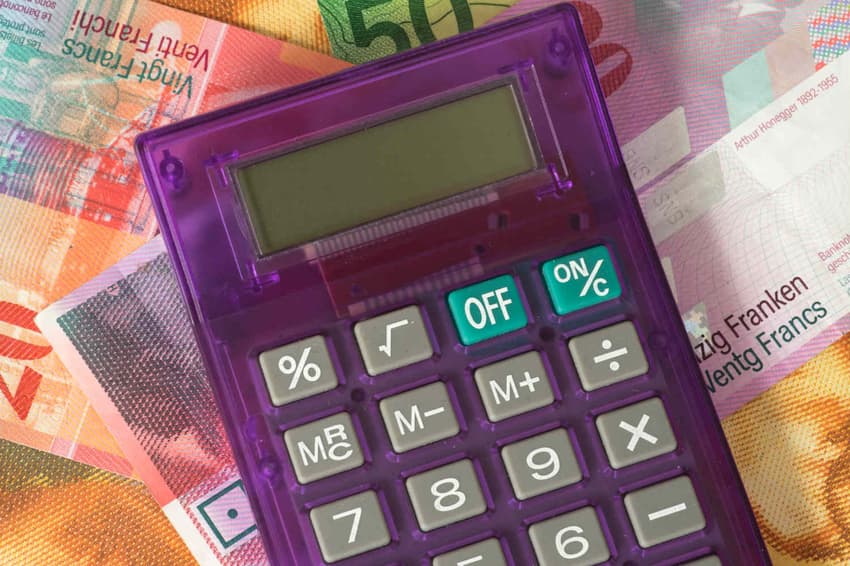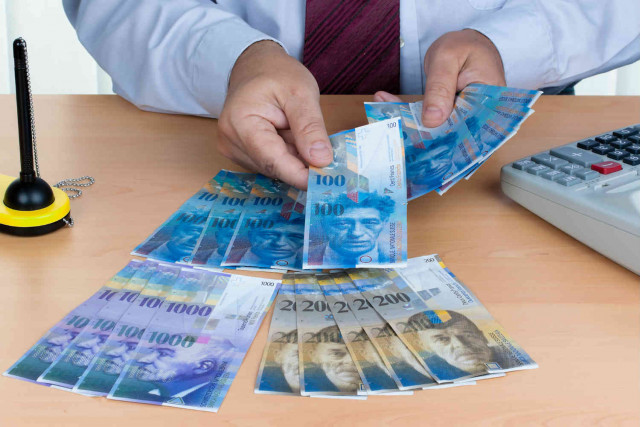Switzerland's strangest taxes - and what happens if you don't pay them

From one return per house to tax-deductible bribes, we've listed some of the oddest tax rules in Switzerland.
When the words ‘tax’ and ‘Switzerland’ are mentioned in the same sentence, the word ‘haven’ is usually not far away.
But the diverse nature of the country - and its federal structure - means there are a number of tax laws which can seem incredibly odd, even to the Swiss.
You just like haven
Switzerland has some of the most relaxed taxation laws in the world, which has made it one of, if not the, preeminent tax haven.
See also: Why Switzerland is no longer on the EU's black list of tax havens
These laws - as well as restrictions on overseas entities finding out information about account holders in Switzerland - enabled it to accrue roughly one quarter of the world’s offshore wealth as estimated by the Boston Consulting Group.
Back in 1934, Switzerland criminalised banks revealing the names of account holders to anyone - including overseas tax authorities. Tax evasion is also not criminalised in Switzerland - but is instead punishable by a fine.

Image: Depositphotos
These laws - which remains in force but are albeit watered down due to pressure from the EU and the US - has established Switzerland as a great place to store one’s money, and a terrible place to try and find it.
Read: Here's why the huge Swiss budget surplus is causing headaches
We are family
Unlike in most parts of the world where income taxes are levied on the earnings made by individuals, Swiss income taxes are calculated per household.
This means that only one tax return is submitted per dwelling, which takes into account the earnings of both parents as well as any children under 18. Where a wealth tax applies, it will also be included.
Bribes
While it was repealed in 2016, bribes paid by companies and individuals were previously tax deductible under Swiss law.
The loophole caused an uproar, however pressure on tax authorities - both from within Switzerland and elsewhere - saw the law changed.
Church tax
A country where religious freedom is paramount, it may surprise some Swiss residents to find out that paying church tax is compulsory - or at least for all church members (and companies in 20 Swiss cantons).
Six countries in Europe have a compulsory church tax, with Austria, Finland, Germany, Denmark and Sweden alongside Switzerland.
The church tax isn’t uniform however, with the cantons of Geneva and Neuchâtel both having no compulsory church tax, but making all contributions tax deductible.
Church taxes are only paid by members of the three official Swiss churches - Roman Catholic, Old Catholic and Evangelical - meaning that Muslims, Jews and members of other protestant faiths are not required to pay.
Dog tax
Anyone in Switzerland with a dog needs to pay the dog tax - a regular levy on their best friend. Fortunately for owners of successful show dogs or industrious pooches, the rate to be paid isn’t dependent on the dog’s personal income.
Instead, there will either be a tax per dog, or in some cantons the size and weight will determine the quantum to be paid.

Dog taxes are calculated on the basis of weight, but usually calculated by a person. Image: Depositphotos
The consequences for non payment? While in neighbouring Germany authorities have a right to confiscate the dog and sell it on eBay - yes, that really happened - to recoup unpaid dog taxes, some Swiss authorities had up until recently a relatively morbid way of punishing tax evaders.
Reconvilier, in Bern, had a bylaw which allowed authorities to kill pet dogs if the taxes weren’t paid. This law - originally passed in 1904 - was used in 2011 to try and punish a family who had failed to pay their outstanding dog tax, which amounted to roughly CHF50.
While officials said that the idea of the law was to put pressure on owners to comply, it wasn’t for widespread use.
"This isn't about a mass execution of dogs. It's meant to put pressure on people who don't cooperate."
As reported by The Local in August 2011, the puppy execution law was repealed after an international outcry.
Military service exemption tax?
Military service is compulsory for all Swiss men when they become adults. Men can apply for an exemption if they satisfy a certain criteria, however doing so will require them to contribute in other ways - namely a three percent tax until they turn 30.
The test for an exemption is that the man is unable to reach the standard of “satisfying physically, intellectually and psychological requirements for military service or civil protection service and being capable of accomplishing these services without harming oneself or others”.
If this test is satisfied, he will be forced to pay three percent per year until the age of 30.
A version of this article first appeared on The Local in December 2019.
Comments (2)
See Also
When the words ‘tax’ and ‘Switzerland’ are mentioned in the same sentence, the word ‘haven’ is usually not far away.
But the diverse nature of the country - and its federal structure - means there are a number of tax laws which can seem incredibly odd, even to the Swiss.
You just like haven
Switzerland has some of the most relaxed taxation laws in the world, which has made it one of, if not the, preeminent tax haven.
See also: Why Switzerland is no longer on the EU's black list of tax havens
These laws - as well as restrictions on overseas entities finding out information about account holders in Switzerland - enabled it to accrue roughly one quarter of the world’s offshore wealth as estimated by the Boston Consulting Group.
Back in 1934, Switzerland criminalised banks revealing the names of account holders to anyone - including overseas tax authorities. Tax evasion is also not criminalised in Switzerland - but is instead punishable by a fine.

Image: Depositphotos
These laws - which remains in force but are albeit watered down due to pressure from the EU and the US - has established Switzerland as a great place to store one’s money, and a terrible place to try and find it.
Read: Here's why the huge Swiss budget surplus is causing headaches
We are family
Unlike in most parts of the world where income taxes are levied on the earnings made by individuals, Swiss income taxes are calculated per household.
This means that only one tax return is submitted per dwelling, which takes into account the earnings of both parents as well as any children under 18. Where a wealth tax applies, it will also be included.
Bribes
While it was repealed in 2016, bribes paid by companies and individuals were previously tax deductible under Swiss law.
The loophole caused an uproar, however pressure on tax authorities - both from within Switzerland and elsewhere - saw the law changed.
Church tax
A country where religious freedom is paramount, it may surprise some Swiss residents to find out that paying church tax is compulsory - or at least for all church members (and companies in 20 Swiss cantons).
Six countries in Europe have a compulsory church tax, with Austria, Finland, Germany, Denmark and Sweden alongside Switzerland.
The church tax isn’t uniform however, with the cantons of Geneva and Neuchâtel both having no compulsory church tax, but making all contributions tax deductible.
Church taxes are only paid by members of the three official Swiss churches - Roman Catholic, Old Catholic and Evangelical - meaning that Muslims, Jews and members of other protestant faiths are not required to pay.
Dog tax
Anyone in Switzerland with a dog needs to pay the dog tax - a regular levy on their best friend. Fortunately for owners of successful show dogs or industrious pooches, the rate to be paid isn’t dependent on the dog’s personal income.
Instead, there will either be a tax per dog, or in some cantons the size and weight will determine the quantum to be paid.

Dog taxes are calculated on the basis of weight, but usually calculated by a person. Image: Depositphotos
The consequences for non payment? While in neighbouring Germany authorities have a right to confiscate the dog and sell it on eBay - yes, that really happened - to recoup unpaid dog taxes, some Swiss authorities had up until recently a relatively morbid way of punishing tax evaders.
Reconvilier, in Bern, had a bylaw which allowed authorities to kill pet dogs if the taxes weren’t paid. This law - originally passed in 1904 - was used in 2011 to try and punish a family who had failed to pay their outstanding dog tax, which amounted to roughly CHF50.
While officials said that the idea of the law was to put pressure on owners to comply, it wasn’t for widespread use.
"This isn't about a mass execution of dogs. It's meant to put pressure on people who don't cooperate."
As reported by The Local in August 2011, the puppy execution law was repealed after an international outcry.
Military service exemption tax?
Military service is compulsory for all Swiss men when they become adults. Men can apply for an exemption if they satisfy a certain criteria, however doing so will require them to contribute in other ways - namely a three percent tax until they turn 30.
The test for an exemption is that the man is unable to reach the standard of “satisfying physically, intellectually and psychological requirements for military service or civil protection service and being capable of accomplishing these services without harming oneself or others”.
If this test is satisfied, he will be forced to pay three percent per year until the age of 30.
A version of this article first appeared on The Local in December 2019.
Join the conversation in our comments section below. Share your own views and experience and if you have a question or suggestion for our journalists then email us at [email protected].
Please keep comments civil, constructive and on topic – and make sure to read our terms of use before getting involved.
Please log in here to leave a comment.